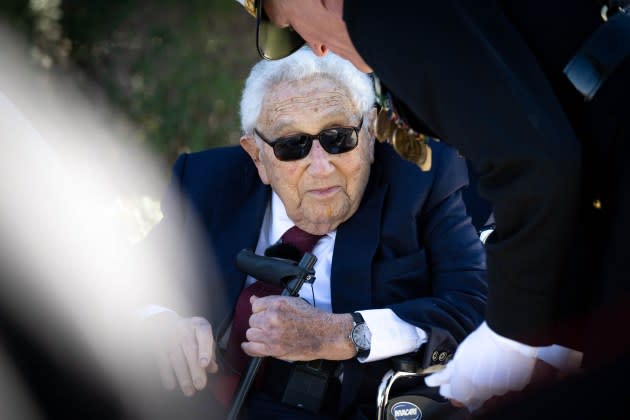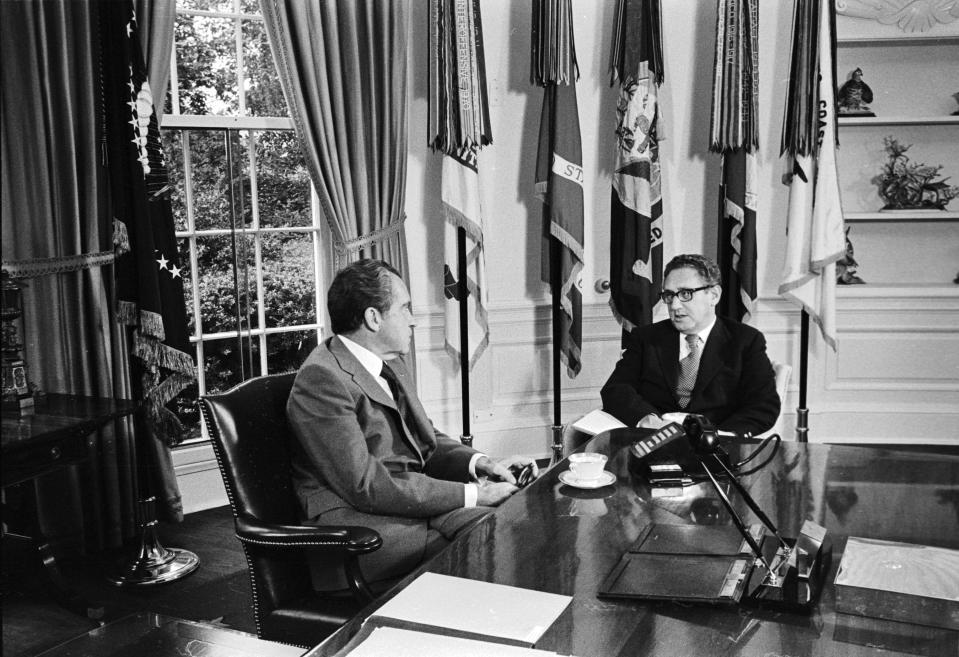Henry Kissinger Dies: Controversial Former Secretary Of State, Nobel Peace Prize Winner Was 100
- Oops!Something went wrong.Please try again later.
- Oops!Something went wrong.Please try again later.
- Oops!Something went wrong.Please try again later.
- Oops!Something went wrong.Please try again later.

Henry Kissinger, who as national security advisor and secretary of state for Richard Nixon and Gerald Ford became one of the most influential, famous and controversial diplomats of the 20th century, died Wednesday in his home in Connecticut. He was 100.
A consultant to almost every President of the United States since leaving the State Department in 1977, Kissinger was instrumental in the historic opening to China in 1972. He was also a hawk during the Vietnam War, a master strategist in geopolitics and Beltway power, and an architect of Middle East shuttle diplomacy. With a realpolitik legacy that is as complicated as any American statesman, the pragmatic and cynical German-born Kissinger also was a much lauded and criticized recipient of the Nobel Peace Prize in 1973 for his role in ending the war in Southeast Asia.
More from Deadline
Disney Is Poised To Benefit From Potential Thaw In China-U.S. Relations, Wall Street Analyst Says
Lawmakers Question Apple On Whether China Concerns Were Behind End Of Jon Stewart's Show
Born Heinz Alfred Kissinger on May 27, 1923 in Fuerth in the state of Bavaria, his Jewish family fled the Nazis and Germany in 1938. Becoming a naturalized U.S. citizen in 1943, Kissinger served in the U.S. Army in the last days of World War II before attending Harvard on a scholarship. Earning his doctorate foreign policy in 1954, the ambitious Kissinger was a member of Harvard’s faculty for almost two decades.
But Kissinger, who loved to tell foes and friends that “power is the great aphrodisiac,” had ambitions beyond academia. Nelson Rockefeller, having just served as special assistant to President Dwight Eisenhower, tapped Kissinger, then a graduate student, to serve as a director of a special Rockefeller Brothers project in the 1950s. By the late 1960s, after Kissinger served as a foreign policy adviser to Rockefeller during his presidential campaigns, Nixon selected him as his national security adviser.

It was a odd and sometimes competitive relationship between the men that would change world history. Kissinger played a central role in Nixon’s crowning foreign policy achievement: opening U.S. relations with China. Following Nixon’s reelection in 1972, Kissinger gained added influence when Nixon selected him to also serve as Secretary of State. He was a central figure in negotiating an end to U.S. involvement in Vietnam early the next year, earning him the Nobel prize along with North Vietnam’s Lê Đức Thọ. But Kissinger was a central figure in the administration’s widening of the Vietnam conflict earlier in the Nixon presidency, as well as the bombing of Cambodia, drawing critics’ condemnation and accusations that he should be held responsible for war crimes. A late-1972 Christmas-time bombing campaign in North Vietnam — designed to get Hanoi back to the negotiating table — reignited peace activists in the U.S.
In 1973, Kissinger also led the diplomatic effort to end the Yom Kippur War, his influence perhaps even more pronounced with Nixon drowned in the Watergate scandal. Closely scrutinized also has been the U.S. role in the military coup that overturned the Marxist government in Chile — and the part that Kissinger played. According to NPR, a Senate report concluded that there was no evidence the U.S. was directly involved “covertly” in the coup, but Kissinger told Nixon five days after the government was overthrown: “We didn’t do it. I mean we helped them. [Word missing] created the conditions as great as possible.” When Nixon resigned, President Gerald Ford retained Kissinger as Secretary of State, although the new presidential eventually named Brent Scowcroft as his national security adviser.
As he gained fame for his shuttle diplomacy, Kissinger, always aware of the power of perception, relished his celebrity status in the 1970s, mingling with actors at the world premiere of The Godfather in 1972 and appearing on the Dean Martin Celebrity Roast of Bob Hope in 1974. As he remained in the public eye as an elder statesman decades later, he even did the weather for CBS’ morning show in 1991.
A close pal of Paramount executive Robert Evans, the much caricatured Kissinger was depicted in dozens of TV shows. films and more over the decades — some less flattering than others. Paul Sorvino portrayed Kissinger in Oliver Stone’s 1995 movie Nixon, while Thomas Hammons played him in John Adams’ opera Nixon in China in its 1987 debut, to name but a few. Most recently, Liev Schreiber was Kissinger in the Helen Mirren-led Golda, as the Israeli PM and the U.S. cabinet member tried to turn the tide of the widespread and Soviet-backed attack on the Jewish state in 1973.
Kissinger married Nancy Maginnes, an aide to Rockefeller, in 1974.
Though never far from the center of power one way or another, after leaving government work, Kissinger took on roles on various boards and universities as well as penning his memoirs.
Kissinger was instrumental in 1979 in getting the deposed Shah of Iran, an old friend, admitted to the U.S. for cancer treatment — an event that led in part to the hostage crisis that crippled Jimmy Carter’s presidency and saw dozens of Americans harshly imprisoned for 444 days by Ayatollah Khomeini’s regime. In 1982, he opened Kissinger Associates. The firm’s Park Avenue offices (which was one of the great private museums of Chinese art, we can tell you from personal experience) came to represent not only the Middle Kingdom and other nations but also the heights of corporate America with clients such as Coca-Cola, American Express and ExxonMobil.
Kissinger continued to appear in the public eye up until earlier this year, when he gave interviews marking his 100th birthday and opined on issues including artificial intelligence.
In addition to his wife Kissinger is survived by his children Elizabeth and David, the latter the president of the television company Conaco, from his first marriage to Ann Fleischer; and five grandchildren.
Kissinger will be interred at a private family service. At a later date, there will be a memorial service in New York City. In lieu of flowers, the family suggests considering donations to: Animal Medical Center, Development Office, 510 East 62nd Street, New York, NY 10065 or Henry A. Kissinger Center for Global Affairs, Johns Hopkins University School of Advanced International Studies, 1717 Massachusetts Avenue, NW, Washington, DC 20036.
Best of Deadline
Sign up for Deadline's Newsletter. For the latest news, follow us on Facebook, Twitter, and Instagram.

